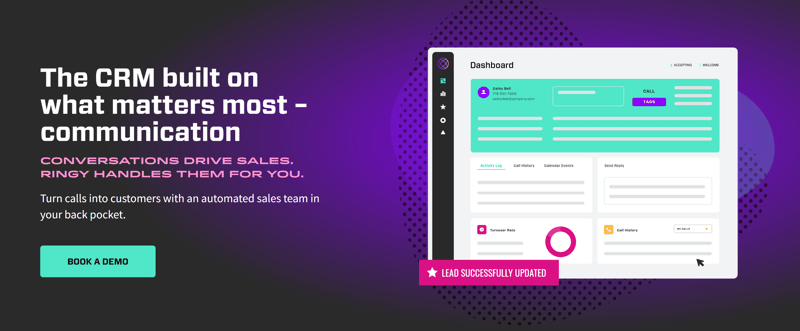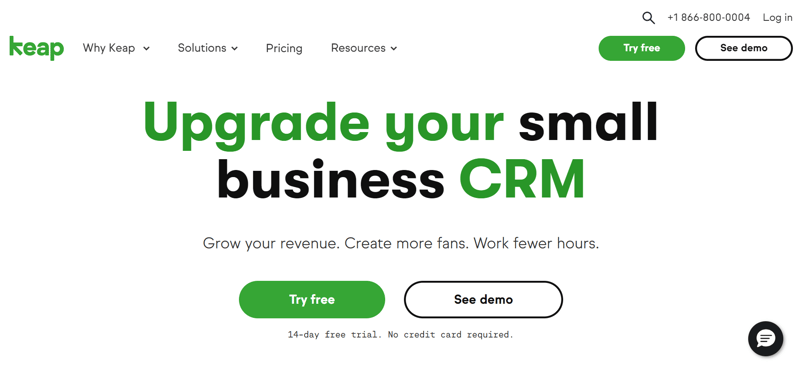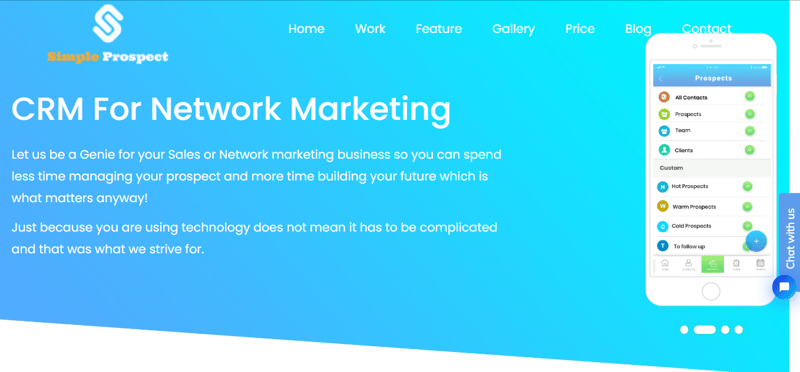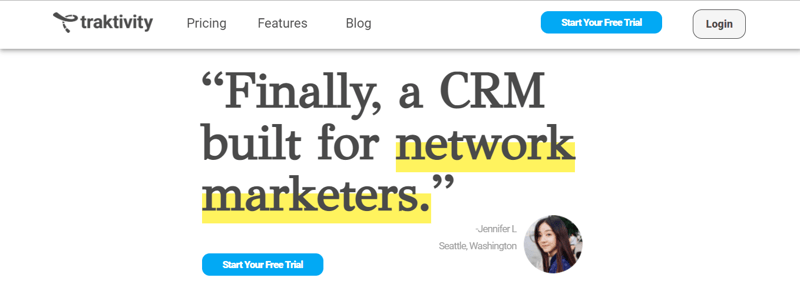
A Guide on Network Marketing CRM (AKA Direct Sales CRM)
 Updated on
Updated on
 By Bradley Kovacs
By Bradley Kovacs
Bradley Kovacs
Bradley has been passionate about technology since childhood, starting with Microsoft Flight Simulator at age six. In college, he automated his data e...
learn more
Bradley Kovacs
Bradley has been passionate about technology since childhood, starting with Microsoft Flight Simulator at age six. In college, he automated his data e...
Table of Contents
Table of Contents
Wait - CRM for network marketers?
It seems like every business benefits from a CRM!
CRM for direct sales maybe even more important than it is for other industries.
You're already observing leads, monitoring sales progression, scheduling presentations, and managing your team – but that team has a team under them? And that team has more distributors under them?
Things'll get chaotic without organization. Quick.
Enter direct sales CRM. A simple way to sort prospects, keep an eye on your growing team, and sort out who sells what, where it happens, and how successful it was.
And if 91% of businesses with over 10 employees implement a CRM…imagine how much it helps with hundreds.
We've captured your interest.
Network marketing CRM – let's go, baby.
What is Network Marketing CRM?
Network marketing CRM software, also called direct sales CRM, is a multi-level marketing management tool.
It allows an admin to manage their network, employees, and payment system. CRM for network marketers also gives easy access to network status, income, payouts, and referral management to distributors.
Most organizations and industries can benefit from CRM software, but it's critical for sales. Especially the direct sales industry.
Network CRM can offer:
- Lead and client management
- Team management
- Order management
- Event scheduling
- VoIP softphone and texting
- Automation
- Analytics, reporting, and data
And here's a juicy little CRM stat: At least 50% of network marketing participants drop out after one year. But CRMs are known to improve customer retention by up to 27%.
Pair a network CRM with a great sales plan and you'll be grabbing solid prospects, retaining more employees, and selling like crazy in no time.
Definition of Direct Sales
Direct sales, or direct selling, is a business model that relies on person-to-person sales by independent individuals – hence the name direct sales. No retail environment is involved and many workers sell through their home, their office, or online.
Network marketing may entail building yourself a network of other salespeople to help with lead generation, connections, and making sales. After recruiting additional distributors, your newly created tier is called your downline and you'll earn money off your own sales as well as a commission from theirs. The tier above you (whoever recruited you) is called your upline and they earn a commission off of your sales.
In time, more salespeople may form under the tier that you formed…
Multi-level marketing. Get it?
And let's clear the waters right now – network marketing is not a pyramid scheme. Pyramid schemes have a heavy focus on startup costs such as training materials, metric tons of products you don't need, and random hidden fees.
Pyramid schemes make money off of their distributors. Not their product.
History of Network Marketing
Network marketing and businesses like it have existed since the 1920s and 1930s, such as the California Vitamin Company (later renamed Nutralite) and the California Perfume Company (now called Avon – yup, you know them, don't you?).
The concept of multi-level marketing seems to have been discovered by accident when distributors realized they were generating more money for the company after referring friends and relatives to the business. At first, there was no system to reward those who recruited other distributors.
The industry quickly realized the benefit of rewarding those people.
Why Do You Need a CRM for Network Marketing?
Building a successful network marketing or direct sales business relies heavily on effective relationship management. Juggling leads, prospects, customers, and teammates can become overwhelming, especially as your network grows. That's where a network marketing CRM (customer relationship management) software comes in.
Here's why a network marketing CRM is essential for your success:
1. Tailored to Your Network
Unlike generic CRMs, network marketing CRMs understand the unique nuances of your business. They offer features specifically designed to manage your downline, track team progress, and nurture relationships with potential recruits. Think of functionalities like:
- Team management tools: Track individual and team performance, set goals, and offer targeted support.
- Automated workflows: Send personalized welcome messages to new recruits, schedule follow-up emails, and automate essential tasks.
- Lead nurturing campaigns: Engage potential customers with targeted content based on their interests and stage in the sales funnel.
- Social media integration: Easily connect with prospects and team members on various platforms directly within the CRM.
2. Relationship-Building Powerhouse
Network marketing thrives on building genuine connections. A dedicated CRM for network marketing helps you:
- Store detailed contact information: Remember birthdays, preferences, and past interactions for personalized communication.
- Track communication history: See all interactions with each contact, from phone calls to emails, for a holistic view.
- Segment your network: Group contacts based on interests, needs, and progress for targeted messaging and support.
- Send personalized emails and messages: Craft individual outreach based on specific information, fostering stronger relationships.
3. Data-Driven Decisions, Amplified
Network marketing CRMs go beyond just contact management. They provide valuable insights to optimize your strategy:
- Track key metrics: Analyze team performance, conversion rates, and campaign effectiveness for data-driven decisions.
- Identify top performers: Recognize and reward team members driving results, and motivating your downline.
- Generate reports: Gain insights into your overall network, allowing you to identify areas for improvement and growth.
4. Efficiency Unleashed
Juggling multiple tasks in network marketing can be chaotic. A CRM for network marketing streamlines your workflow by:
- Automating repetitive tasks: Free up your time for higher-value activities like building relationships and closing deals.
- Centralizing all your data: Eliminate information silos and access everything you need from one platform.
- Mobile access: Stay connected and manage your network on the go, maximizing productivity.
Types of CRM for Network Marketers

Different sorts of direct sales CRM exist for different purposes. There isn't any clear line drawn between them and they may bleed into each other, containing common features from various types.
But generally, network CRM can be divided into three varieties:
|
Name and main features |
Your needs |
|
Operational
|
|
|
Analytical
|
|
|
Collaborative
|
|
You'll see a lot of these features overlap between CRMs, but it's important to know your software's focus. We talk about this in-depth in our blog post on CRM analytics.
5 Benefits of Network CRM
A piece of software that can help you manage your product, customers, distributors, and the distributors under them?
The benefits almost never end.
But here are our favorites.
1. Team Management Made Easy
How many people were recruited last month? Who made which sale? Which new recruit has awesome selling potential?
A lot more than you'd think goes into managing sales reps. Dates, income, effectiveness, quotas, network tiers…
It's enough to make you cry.
But streamlined, easy-to-use team management is what makes the best CRM for network marketing. It'll facilitate tracking performance-based compensation, optimizing your pipeline, efficiently organizing the workload, and helping sales reps build crucial skills.
You not only want to build up your salespeople's performance, but you also want to address issues before they get out of hand. A certain distributor struggling to make quota? Without a network CRM that could go on unnoticed for months.
And it isn't only the reps with suffering performance you should watch. Your high-performers should be monitored closely.
Why?
Because employees who aren't recognized for great work are 2X more likely to quit.
Network marketing CRM software makes sales performance management simple, so you aren't left out of the loop.
2. Lead and Target Management
Managing leads, customers, and prospects are right in the name of a direct sales CRM. Psst…it's the C part.
Direct sales CRM allows you to:
- Set clear goals
- Define specific targets and qualify good prospects
- Generate and capture leads
- Nurture quality leads
- Categorize leads by demographic, buyer stage, and more
- Monitor lead progression
A lot goes into making a sale. A lot that can quickly get disorganized. And disorganized target management will lose you time – and leads.
Lead generation is the core of your business.
61% of marketers rank lead generation as their number 1 challenge – but 85% of B2B marketers say that lead generation is their number 1 marketing goal.
If it's the most critical thing in your business but also the hardest thing to achieve…having software to facilitate it is going to be a lifesaver.
3. Reduced Costs
Cloud-based software is generally pretty affordable and a low-cost CRM for direct sales isn't hard to find. And what's more, they give you a great ROI.
Let's examine the depth of how much money you can save by adopting a network CRM:
|
Problem |
Result |
Solution |
|
Spending unnecessarily |
|
CRMs keep track of stock and analytics tell you what's selling |
|
Paper costs
|
|
Paper is all but eliminated |
|
Cost of attracting new customers |
CRMs make it smooth and automated to generate, monitor, and follow-up with leads |
|
|
IT costs |
Small businesses spend 6.9% of their revenue on IT Midsized businesses spend 4.1% of their revenue on IT |
CRMs have excellent support staff |
|
Mistakes, typos, and incorrect data The wrong number calledThe wrong parcel sent Forgot to call back |
Bad data costs US businesses $3.1 trillion per year One typo led the Mizuho Securities Co. to lose $340 million |
Minimize mistakes with AI-powered processes and automation |
It isn't hard to believe that the average ROI after implementing a CRM is 771%.
No really, it is!
4. Keep you organized
A killer CRM for network marketing makes it easy to keep track of everyday sales issues, which can overlap and end up causing a confusing headache.
Network CRM can keep things tidy by:
- Making calls to prospects
- Communicating with distributors
- Communicating with new recruits
- Organizing a presentation
- Following up with previous prospects
- Monitoring existing ad campaigns
- Scheduling company meetings
Writing all those out on Post-It notes and sticking them to your desk is one way of dealing with organization…
But a CRM with scheduling, reminders, and notifications is the way of dealing with the organization.
Ringy has a myriad of awesome organization features such as calendar organization, meeting reminders, automated notifications across teams, and the ability for prospects to schedule their own appointments.
Not to mention how neat everything gets after factoring in Ringy's seamless integration with Zapier, Boomi, and Integrately, which increases functionality, ease of use, and productivity.
5. Get your distributors together on one simple platform
Somewhat related to team management and organization – but it deserves its own section. Trust us.
With multi-level marketing, you can have distributors on distributors on distributors. Tier after tier of sales reps and team members. If you can't keep track of all of them with a simple spreadsheet, no one blames you.
Getting all of your distributors wrangled in one system will make your life simpler. Especially with the growth in the direct sales industry: 125.4 million independent representatives participated in direct selling in 2020, which is an increase of six million compared to 2019.
It's an industry that just keeps growing. And implementing an easy hub for them all to meet up on will allow you to have reps all over the country and still keep an eye on them. It'll also allow them to have a centralized location to update you, communicate with other distributors, and ask for help when needed.
How to Succeed with a Direct Sales CRM
Here's how a direct sales CRM can unlock your network marketing potential:
1. Keep Track of Customer Information
Gone are the days of scribbling notes on scraps of paper! A network marketing CRM acts as your central hub, storing essential information about your entire network. This includes:
- Contact details: Names, email addresses, phone numbers, and social media handles.
- Purchase history: Track what products each customer has purchased, when, and for how much. This helps in personalized recommendations and upselling opportunities.
- Interaction history: Log all your interactions with each contact, including phone calls, emails, and social media messages. This builds a complete picture of your relationship and their interests.
- Lead source: Remember how you met each person? Categorize them by event, referral, or online channels to understand what marketing efforts are working best.
2. Segment Your Customer Base
Not all customers are created equal. A powerful direct sales CRM allows you to segment your contact list based on various criteria, such as purchase history, demographics, and interests. This enables you to:
- Target specific promotions: Craft personalized email campaigns or social media posts tailored to each segment's needs and preferences. Imagine sending skincare product recommendations only to customers who have purchased beauty items before.
- Offer relevant upsells: Recommend complementary products based on their past purchases, increasing your average order value.
- Provide targeted support: Segment by customer concern or product issue, allowing you to address their needs efficiently.
Remember, personalization is key to building trust and loyalty, and a network crm empowers you to achieve it effortlessly.
3. Build Trust and Rapport
Direct sales thrive on relationships. A CRM for direct sales helps you nurture these connections by:
- Remembering important dates: Automatically schedule birthday and anniversary greetings, showing you care beyond just making a sale.
- Tracking communication history: Review past interactions to personalize conversations and demonstrate you remember their specific needs.
- Sending personalized messages: Create automated email sequences or social media messages welcoming new leads, expressing gratitude for purchases, or simply checking in.
4. Provide Consistent Communication
Staying in touch is vital in network marketing. A direct sales CRM helps you:
- Schedule follow-up tasks: Set reminders for phone calls, emails, or social media messages, ensuring you nurture every lead and address customer concerns promptly.
- Automate repetitive tasks: Schedule automated email sequences for onboarding new leads, providing product updates, or offering special promotions.
- Create email templates: Craft pre-written messages for common inquiries or follow-up emails, saving you time while maintaining a professional tone.
5. Measure Results and Implement Improvements
Success in direct sales requires constant improvement. A network marketing CRM provides valuable insights by:
- Tracking key metrics: Analyze sales figures, conversion rates, and campaign performance to understand what's working and what needs adjusting.
- Identifying top performers: Recognize your most successful team members and learn from their strategies.
- Spotting trends: Analyze customer behavior and preferences to adapt your approach and personalize your offerings.
6 Network Marketing CRM Software Selection Criteria

So, what to consider when choosing a network marketing CRM software?
Those little star ratings on software review sites do help – but we're going to give you some solid points and great features that should definitely be in the best CRM for direct sales.
1. Customer and team management capabilities
Obvious, yes. But it is the most important.
We've stressed the importance of managing, grouping, and communicating with every tier of your distributors. There will be chaos, mass employee turnover, and struggling sales reps going unnoticed.
And managing your customer base is equally important. Where is Lead A in the sales funnel? When did Client B buy the product? How much is Prospect C willing to spend?
Excellent customer and employee management will save your life.
2. Automation
Why do everything yourself when automation is there to save the day?
Automating with a CRM for direct sales will save you time, money, and sanity. From reminders and notifications to drip campaigns, everything is better automated.
Prospect interaction, social media marketing, product marketing, reporting, and more can be automated. And anything automated saves time, improves efficiency, and reflects business growth.
Plus, manual payout calculation can be a huge hassle the more distributors you have on board. Automated commission calculation is a huge load off your shoulders.
Choosing a network CRM with great task automation is a no-brainer.
3. Solid analytics and big data
A CRM weak with analytics is not the best CRM for direct sales.
Being able to not only monitor the efficacy of a certain campaign but also the performance of your team is going to impact your business in a big way.
Organizations are seeing mad numbers by utilizing analytics in a network CRM:
- 69% - chance of better strategic decisions
- 54% - chance of enhanced operational process control
- 52% - have a better understanding of consumers
- 47% - have an effective cost reduction
4. Security and privacy
Credit cards, client addresses, contact information – your system can hold a lot of sensitive information. It isn't a surprise that security is a huge priority.
Fact: The average cost of recovering from a security breach is $38,000 for small businesses and $551,000 for enterprises.
And that's only the cost of system recovery. That isn't counting possible legal expenses from losing customer data.
A network CRM has to have top-notch security. It could be saving you thousands.
5. VoIP texting and calling
Network marketing CRM software is about one bajillion times better when it has VoIP texting.
VoIP softphone and texting offer so much to a network marketing team that it's crazy. Simple click-to-call capabilities, campaign management, reduced costs, call recording, mobile access, conversion increase, local presence dialing…
What's that? Do you want to learn more about local presence dialing?
6. Ease of use and straightforward interface
Look, not all network CRMs are built the same. Some CRMs may have stellar features, a great price tag, and rave reviews but if they aren't simple to understand it isn't going to work out.
72% of CRM users say they would trade functionality for ease of use.
It's especially important if you have a large number of distributors who are going to use the software. You don't want your team focusing on the system's learning curve, do you? You want them focusing on sales, product, presentations, prospects…
You know. Their jobs?
7. Scalability
A scalable CRM adapts seamlessly to your evolving needs, ensuring smooth operations regardless of size. Here's why scalability is paramount:
- Accommodating Growth: As your network expands, your CRM should effortlessly handle the influx of new distributors and customers. Look for solutions that offer flexible user management, allowing you to add new accounts and teams without performance hiccups.
- Data Management: A scalable CRM efficiently stores and manages ever-increasing data volumes. This includes distributor information, customer data, sales records, and downline structures. Ensure your chosen platform can handle this growing data without compromising speed or security.
- Complexities Handled: As your network matures, complexities arise. Your CRM should be able to adapt to these complexities, such as handling intricate compensation plans, managing multi-level hierarchies, and tracking diverse sales funnels.
- Future-Proofing: Don't limit yourself! Choose a scalable CRM that can accommodate your future aspirations. Consider features like API integrations, customizability, and mobile accessibility to ensure your CRM grows alongside your ambitions.
- Remember, a scalable solution doesn't just handle more data; it empowers you to manage your network with greater efficiency, effectiveness, and strategic foresight.
6 Best CRM for Network Marketing
That's right, we're not just going to list off some features then leave you twisting in the wind. We're going to give you some great recommendations to get you started.
So let's take a look at some of the top direct sales CRMs available.
1. Ringy
Ah yes, we know you expected this one. But give us a minute to explain!

Ringy is an all-in-one experience with the same state-of-the-art tech used by the big-name CRMs. It allows your sales reps to streamline their workflow, reach more prospects, and make data-driven decisions to boost business growth and productivity.
Ringy includes amazing network CRM features like:
- Lead management
- Task automation
- Lead generation software
- VoIP softphone and texting
- Detailed analytics and reporting
- Straightforward interface and simple learning curve
And with the highly competitive price of $119 / month, we honestly think Ringy is the best CRM for direct sales.
2. Keap
Aimed at sales professionals, advertising, and marketing, Keap is a big name in the CRM industry.

Email, text messaging, payment management, and more are available through Keap. It features 24/7 support and promises a slick, easy-to-use interface.
Users say that pipeline management is attractive and simple to use. It's also pretty highly rated for its client management, automation, and email campaigns.
Though some people aren't a fan of how confusing some features are, like the group texting and user permissions. Some users also said it's kind of buggy.
3. Fiitfu
A platform built specifically for multi-level marketing, Fiitfu is a powerful system for growing your business and managing your clients.

Fiitfu includes some solid network CRM features like:
Detailed client profiles to keep track of referrals, interests, events, and more
Follow-up funnels to monitor team members, customers, and hostesses
Order management, keep track of who sold what, who bought what, and send out re-order reminders
Its support and AI functionality are both rated somewhat low, though. But you can't always have it all.
4. CapsuleCRM
"Simple but powerful" is Capsule's main claim.

And they look like they know what they're talking about. Capsule CRM has a focus on nurturing client relationships through logged conversations, emails, and calls, even importing your already present contact data by way of Outlook, Google Contacts, CSV, and more.
Sales analytics, great pipeline visualization, and calendar management are a sampling of other features it includes.
However, quite a lot of people seem to be in agreement about its confusing interface and unintuitive dashboard. It also doesn't support email campaigns, which is a little disappointing.
5. Simple Prospect
A CRM for network marketers and sales teams, Simple Prospect is primarily a mobile app.

It has the basic functionality of a direct sales CRM like event scheduling, prospect management, and team management. But it also has more mobile-centric additions of business card scanning, quick note logging, and desktop exporting if you need to transfer your work to a computer.
Of course, being a mobile app, it's a little lackluster compared to other CRMs. But it's a great option for new start-ups.
6. Traktivity
Traktivity is all about strengthening connections for network marketers and helping them grow their bottom line.

Manage your prospects, connect with clients, communicate with teammates and distributors, keep track of your calendar, and more.
Over 10,000 network marketers use Traktivity to track conversations over social media, log texts and emails, and automate event and shipping reminders.
Once again, it's mainly a mobile app so it's missing some of the fancy features that a full, all-in-one CRM includes, like VoIP calling and detailed data. Plus, some users say it's pretty glitchy.
Frequently Asked Questions
What Is Network CRM?
Network CRM, network marketing software, and CRM MLM all refer to customer relationship management software that's used in the direct sales industry. It facilitates lead management, team management, helps handle commissions, automates campaigns and reminders, and so much more.
Is CRM Used in Marketing?
Are katanas used by samurai?
But seriously, that's how important of a tool CRM is to marketers. Generating leads, managing contacts, automating email and text campaigns, and monitoring social media conversations – a CRM is the secret weapon of marketing.
Why not see all that digital marketing CRM can do?
Why Do You Need a Direct Sales CRM?
Because Sales reps only spend 33.3% of their day selling because of poor time management.
CRM software improves sales by up to 29%, sales forecasting accuracy by up to 32%, and productivity by up to 39%.
Does that answer your question?
Conclusion

Network marketing CRM software is an efficient, cost-effective solution to your direct sales business. Helping to manage contacts, monitor social media, manage automatic campaigns, communicate with distributors, and effectively train recruits, it's basically a team member in its own right.
Some CRMs are built specifically for MLM, although you may find that a broad, all-in-one CRM like Ringy is the best answer.
It won't be limited and it will definitely include a huge range of features that others might not, like VoIP softphone, text drip campaigns, and amazing analytics.
Why not request a demo with Ringy and try it for yourself? We'd love to walk you through its outstanding network marketing benefits.
Ringy may just be the perfect tool for your direct selling business.

Skyrocket your sales with the CRM that does it all.
Calling? Check. SMS? Check. Automation and AI? Check. Effortlessly keep in touch with your customers and boost your revenue without limits.

Take your sales to new heights with Ringy.
Sales in a slump? Ringy gives you the tools and flexibility you need to capture leads, engage with them, and turn them into customers.
Subscribe to Our Blog
Enter your email to get the latest updates sent straight to your inbox!
Categories
Related Articles




































































































